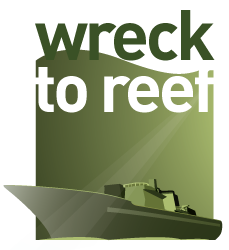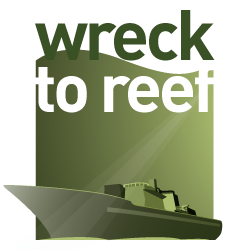Much has been happening since the last W2R update but due to the nature of the W2R progress, (meetings, politics etc) there has not been much in the way of headline grabbing news to report, resulting in a dearth of publicity recently. However, rest assured that the W2R team has been meticulously threading its way through the various bureaucratic obstacles and we feel we are nearing the day that we will actually be placing the first artificial reef on the seabed.
As mentioned in a previous update, we have secured funding from Europe for part of the lobster restocking reefs but the reality of gradually drawing-down this money seems to be taking up a disproportionate amount of our time, such is the bureaucracy involved in this process.
W2R gave a detailed presentation to the Dorset Coast Forum in December where the project was debated. It was a very useful exercise in that all the Statutory Authorities who will be consulted once our FEPA Deposit Licence application is lodged with the Marine Management Organisation (MMO) were in attendance. Our MMO Case Officer, Colin Robson also attended and met with Dr Antony Jenson of Southampton University who is producing our Environmental Impact Assessment (EIA) along with Dr Ken Collins et al.
The EIA will need to be completed before our FEPA Deposit Licence can be applied for.
Fortunately, Chris Pater of the English Heritage Maritime Team attended and pointed out that we had not yet contacted him with regards to investigating whether there were any existing historic wrecks within our W2R seabed area; this was an oversight on our part and would have undoubtedly led to a delay in our FEPA Deposit Licence application once submitted. We had previously checked for any visible sign of wrecks on the seabed but Chris pointed out that we needed to establish if any wrecks lye beneath the seabed. The upshot is that Justin Dix of Southampton University has existing geophysical data that shows that the W2R area is clear of existing wrecks. Establishing this has delayed the EIA somewhat, but better now than later when it would have compromised our FEPA Deposit Licence application.
Although the W2R team had already met with most of the Statutory Authorities, it was decided to arrange formal meetings with Natural England and also the Dorset Wildlife Trust prior to the finalisation of our EIA in order to obtain their views on its content. Dr Antony Jenson and Dr Ken Collins accompanied Neville Copperthwaite to these meetings and the meetings proved to be extremely helpful not only in a pragmatic way but also in a less tangible way because of the opportunity to observe the thinking of the people that comprise these organisations. For the W2R project to succeed and be meaningful in the long term, it is crucial that there is coherence with mainstream environmental philosophy not only in the development stages but also with regard to on-going monitoring.
Learning from experience, I am reluctant to give time scales but as I write, I am expecting the draft of the EIA to materialise from Southampton. This will allow us to submit our FEPA Deposit Licence application within the next few weeks and all being well we should be in a position to start laying down the first part of the lobster restocking reef in June of this year.
Funding for the first ship is proving to be a problem still, made all the more difficult by the recent slashes in national budgets by the government. We have however embarked on a campaign to persuade the Government to give us a ship by Deed of Gift much as is practiced in Australia. We have sought the help of various members of parliament and we feel that we are building a head of steam. Through our local MP, Richard Drax and also Cabinet Minister Oliver Letwin who’s constituency is just down the road from us, we are lobbying Defra and the MoD to identify a mechanism that would enable the Deed of Gift Idea to become a reality. Mike Penning MP, Under Secretary of State and Peter Luff MP, Minister for Defence Equipment has also been canvassed. In addition, some members of the Olympic Legacy Board – via Richard Drax – has petitioned Nick Hurd MP, Minister for Civil Society, the man charged with the job of rolling out the Prime Minister’s Big Society philosophy. Linked to this, Sean Webb, a director of W2R has written to David Cameron, PM, pointing out the similarities of the community benefit aims and gaols of the W2R project to those of the Big Society ethos. It is suggested that the W2R project would make a perfect flagship project for the Big Society to embrace and support.
The Secretary of State for Olympics and Sport, Jeremy Hunt MP was canvassed for support and a very nice letter was received from his public engagement man-on-the-desk saying that we were doing all the right things and to carry on doing what we are doing and it will all turn out all right in the end; but no practical help or support at all.
A few letters of support for the W2R project to Jeremy from readers of this update would be enough to enable us to revisit his department!
And finally, last week the W2R team were invited to an official viewing of HMS Nottingham and HMS Southampton moored in Portsmouth Dockyard, both having been recently decommissioned. Geoff Petherick, Leader of Weymouth and Portland Borough Council and Olympic Legacy Board Member, kindly accompanied us. It was explained to us that the current market scrap value of one of these Type 22 Destroyers is approximately £300,000. However, if a good community case can be made it is possible to acquire one of these vessels for considerably less. And then of course, funding has to be sourced to pay for an environmental clean-up of the ship.
Our case is this: Looking at this purely in financial terms, a Type 42 Destroyer’s market scrap value is around the £300,000 mark but this is a one-off payment which would be returned to the coffers, whilst to scuttle a Type 42 as an artificial reef brings a return of £5,000,000 to the economy in the locality of the scuttling, on an annual basis for many years. This figure is taken from a report by the Devon and Cornwall Business Council who point out that the scuttling of HMS Scylla has increased the local economy by £25 million to £30 million during the last five years. Of course, the counter argument is that the increased financial benefit goes to the wider community rather than directly back to the MOD but this is where there needs to be some joined-up thinking between government departments in order to maximise the benefits of our used resources.



No comments yet.